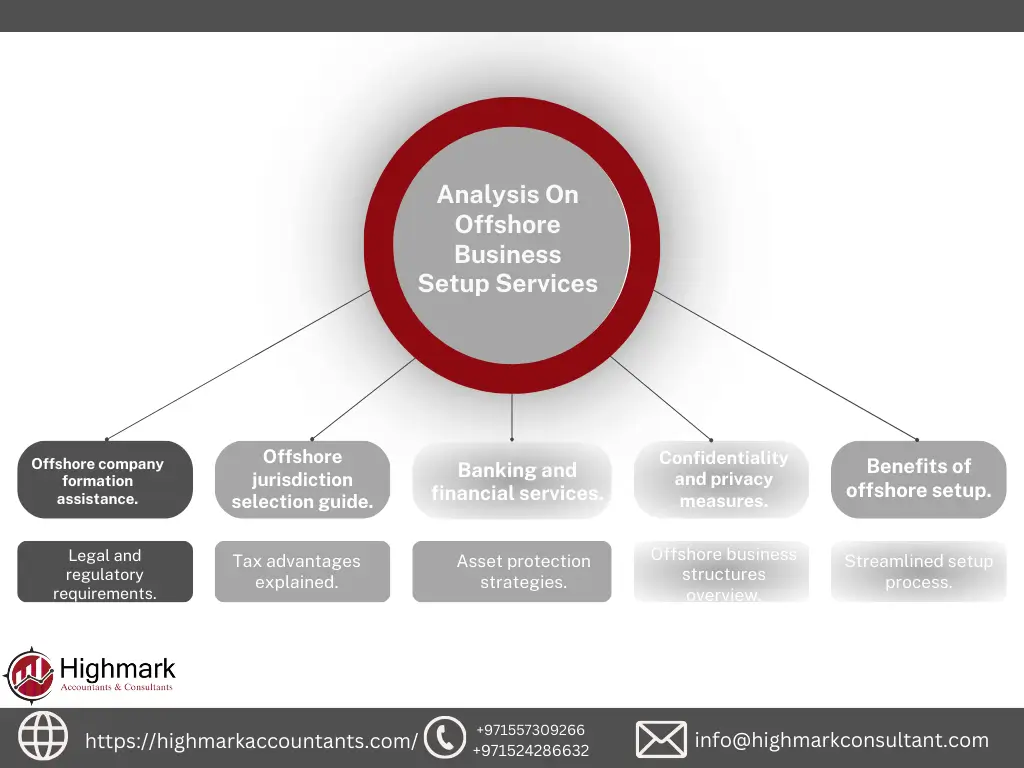Debunking Offshore Business Formations: Just How They Operate and What to Anticipate
Offshore firm formations can seem facility and enigmatic. Offshore Company Formations. These entities, usually established for tax benefits and personal privacy, run under one-of-a-kind legal frameworks. Business owners might locate themselves navigating via a maze of regulations and compliance demands. Recognizing the details is essential for success. What are the actual benefits? What are the prospective risks? A closer exam reveals the nuances that could influence decision-making substantially
Recognizing Offshore Business: Kinds and definitions
Offshore firms are entities developed in a jurisdiction outside of a person's or organization's key country of residence, usually for purposes related to tax optimization, possession protection, or governing benefits. These firms can take numerous kinds, consisting of restricted responsibility firms (LLCs), global business companies (IBCs), and offshore counts on. Each type offers specific functions and attract different needs.
Limited responsibility firms give proprietors with defense from individual obligation, while international service companies are prominent for their adaptability and very little coverage demands. Offshore trust funds, on the other hand, are used primarily for estate planning and possession security.
The selection of jurisdiction significantly influences the company's operations, as some places offer more positive legal frameworks and privacy securities. Offshore Company Formations. Understanding the distinctions between these kinds is vital for services and individuals considering offshore frameworks, as each choice carries different effects for administration and conformity
The Advantages of Developing an Offshore Firm
Establishing an offshore company can supply countless advantages, especially for those seeking to boost their monetary techniques and shield their possessions. One significant advantage is tax optimization; lots of jurisdictions use favorable tax obligation rates or exemptions, permitting organizations to keep even more revenues. Additionally, overseas companies can supply a layer of personal privacy, protecting the identifications of owners and shareholders from public analysis.
Another benefit is property defense. By putting properties in an offshore entity, individuals can safeguard their wide range from possible lawful claims or political instability in their home nations. This framework also facilitates international service procedures, allowing simpler accessibility to varied clientele and international markets.
In addition, the establishment of an offshore firm can boost trustworthiness and prestige, attracting clients who value worldwide company practices. Generally, these benefits make overseas business formations an appealing alternative for people and organizations going for economic growth and protection.
Trick Considerations Prior To Creating an Offshore Entity
Before creating an overseas entity, a number of important elements need to be assessed. Legal conformity demands, tax obligation implications and benefits, along with jurisdiction choice, play a significant function in the decision-making procedure. Comprehending these factors to consider can aid individuals and organizations browse the complexities of overseas company formations efficiently.

Lawful Compliance Demands
When considering the formation of an offshore entity, understanding legal conformity needs is important to ensure adherence to both global and local legislations. Potential company owners should acquaint themselves with policies governing business registration, reporting commitments, and functional standards in the selected jurisdiction. This includes verifying the legal requirements for shareholders and supervisors, as well as making sure compliance with anti-money laundering (AML) and know-your-customer (KYC) guidelines. In addition, services ought to continue to be conscious of any type of licensing needs details to their market. Involving local lawful and monetary experts can supply beneficial insights, making sure that all essential documentation is prepared and sent correctly. Eventually, extensive expertise of lawful conformity assists reduce risks and fosters a lasting overseas operation.
Tax Effects and Advantages
Countless entrepreneur think about the tax effects and advantages of forming an offshore entity as an important element in their decision-making process. Offshore firms can provide significant tax obligation benefits, such as minimized corporate tax obligation prices, exception from particular neighborhood taxes, and the capacity to postpone tax obligations on international revenue. These advantages can bring about improved productivity and capital, making overseas structures appealing for global company procedures. Additionally, the possibility for tax treaties might even more decrease tax responsibilities. It is essential for service owners to recognize the complexities involved, including conformity with both neighborhood and worldwide tax obligation laws. Engaging with tax professionals is recommended to navigate these ins and outs efficiently and guarantee ideal tax obligation planning approaches.
Jurisdiction Option Aspects
What factors should one take into consideration when picking a jurisdiction for overseas company development? Trick factors to consider consist of tax performance, governing environment, and political stability. Jurisdictions with positive tax obligation regimens can considerably affect productivity. The governing landscape ought to provide versatility and simplicity of conformity, permitting reliable business operations. Political stability is vital, as it guarantees the safety of possessions and connection of procedures. Furthermore, the reputation of the jurisdiction can impact customer trust and company relationships. Availability to financial services and the availability of expert assistance solutions are also essential. Recognizing local laws concerning coverage, ownership, and privacy demands is necessary to identify that the overseas entity lines up with the company owner's goals and legal commitments.
Possession The Refine of Establishing an Offshore Business
Setting up an offshore firm includes a collection of tactical actions that require careful preparation and conformity with worldwide laws. A private should pick a suitable jurisdiction that straightens with their company goals and offers desirable tax benefits. Following territory choice, the next step is to pick a special company name and prepare the needed paperwork, including posts of incorporation and shareholder arrangements.
Once the documents prepares, it should be sent to the appropriate authorities in addition to the called for charges. After approval, the company will certainly receive a certification of incorporation, officially establishing its lawful presence. The private should after that open a business savings account to assist in economic transactions.
Ultimately, maintaining an offshore firm involves adhering to continuous compliance requirements, such as annual reporting and tax responsibilities, which differ by jurisdiction. Consequently, understanding each step is crucial for an effective overseas company formation.
Regulatory and lawful Framework for Offshore Firms
While developing an overseas business can use substantial advantages, it is crucial to steer with the complicated legal and regulatory framework that regulates such entities. Each jurisdiction has its very own collection of laws that dictate every little thing from firm development to taxation and conformity needs. These policies are made website here to avoid unlawful tasks, such as money laundering and tax evasion, and typically require comprehensive paperwork and openness.
Key components of this structure include the need of selecting local supervisors, preserving a registered workplace, and sticking to yearly reporting commitments. Furthermore, lots of territories impose details licensing demands for specific company tasks. Comprehending these lawful specifications is critical for guaranteeing conformity and mitigating dangers related to charges or legal conflicts. Consequently, involving with lawyers that specialize in offshore business can aid in steering via this intricate landscape, inevitably promoting a successful and compliant offshore company procedure.
Common False Impressions About Offshore Companies
Lots of people hold false impressions concerning overseas firms, usually relating them with tax obligation evasion and prohibited tasks. Nevertheless, it is necessary to acknowledge that these entities can operate legitimately within a structure made for legitimate company methods. Making clear the lawful standing of overseas companies can help dispel these myths and advertise an extra exact understanding of their purpose.
Tax Obligation Evasion Myths
In spite of the growing appeal of offshore business, mistaken beliefs concerning their use for tax evasion linger. Many people mistakenly believe that establishing an overseas entity is only a method to stay clear of taxes. Nevertheless, overseas companies are frequently made use of for legit objectives, such as property protection, global business expansion, and financial investment diversification. The assumption that all offshore activities correspond to immoral tax obligation evasion ignores the complexities of worldwide tax obligation policies and conformity requirements. Furthermore, the substantial majority of offshore territories have actually executed steps to battle tax evasion, promoting openness and details exchange. This mischaracterization can deter genuine organizations and financiers from discovering the potential benefits of offshore business formations while bolstering a negative stigma bordering these entities.
Legal Status Clarified
The legal condition of offshore firms is commonly misunderstood, causing a variety of misunderstandings. Several believe these entities operate in a legal grey location, thinking they are underhanded or naturally prohibited. Actually, overseas business are legit businesses formed under the legislations of certain territories, made for different reasons, including asset defense and market development. One more typical misunderstanding is that overseas companies avert tax obligations entirely; nevertheless, they are subject to the regulations and tax commitments of their home nations. Additionally, some people believe that offshore firms can be quickly made use of for cash laundering or unlawful activities. While misuse can occur, many jurisdictions implement rigorous compliance and openness regulations to minimize such threats, making certain that overseas firms run within legal structures.

Taking care of and Running Your Offshore Company Successfully
Properly taking care of and operating an overseas firm requires a strategic method that balances compliance with regional guidelines and the search of service objectives. Effective overseas monitoring entails understanding the jurisdiction's tax laws, reporting needs, and functional laws. Using neighborhood specialists, such as accounting professionals and lawful consultants, can supply invaluable insights into traversing these complexities.
Additionally, establishing clear communication networks and operational procedures is crucial for keeping performance. Using innovation for job administration and cooperation can boost performance, while routine performance evaluates assurance alignment with tactical objectives.
Preserving durable monetary documents is crucial, as openness fosters trust with stakeholders and complies with global criteria. Being versatile to modifications in legislation or market problems enables overseas companies to pivot properly, guaranteeing lasting sustainability and growth. By sticking to these principles, local business owner can take full advantage of the benefits of their overseas ventures while mitigating threats.
Often Asked Inquiries
Just how much Does It Price to Maintain an Offshore Business Annually?
The price to maintain an offshore firm yearly differs significantly, typically ranging from $1,000 to $5,000, depending best site upon jurisdiction, services needed, and conformity responsibilities. It is vital to think about extra charges for particular demands.
Can I Open Up a Bank Account for My Offshore Company Remotely?
Opening a savings account for an overseas firm from another location is generally possible. Needs might differ by territory, frequently requiring paperwork and verification processes, which can complicate the remote application experience for people.
Are There Certain Nations Recognized for Easier Offshore Firm Formations?
Certain nations, such as Belize, Seychelles, and the British Virgin Islands, are renowned for their desirable guidelines and streamlined processes concerning offshore firm developments, bring in business owners seeking performance and discretion in service operations.
What Kinds of Services Are Finest Matched for Offshore Firms?
Certain companies, such as investment, working as a consultant, and shopping firms, often take advantage of offshore companies as a result of tax obligation benefits, privacy, and regulatory versatility - Offshore Company Formations. These entities normally prosper in jurisdictions that promote positive service atmospheres
Just How Can I Guarantee Conformity With Local Regulations When Operating Offshore?
To assure compliance with regional regulations when running offshore, it is important to involve legal specialists, perform complete study on jurisdiction policies, and keep clear financial records, therefore lessening risks connected with non-compliance.
